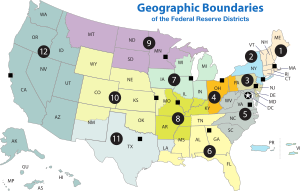 Image via Wikipedia
Image via WikipediaSome significantly bad things are happening or may be or are about to happen, such as:
1. Government’s anti-business attitude.
2. Tax increases: Expiration of the Bush tax cuts, new Obamacare taxes, and possible carbon taxes and food taxes.
3. More large-scale regulations. In addition to the new financial regulations, there will also be HHS and EPA regulations on CO-2, and tightened auto emission standards.
4. The BP oils spill may prompt the Administration to seek new restrictions and taxes on the oil companies. Already, thousands have been put out of work by the ill-advised offshore drilling moratorium.
The Fed has pumped trillions of dollars into the economy ($1.2 trillion announced in March 2009, bringing their asset total to more than $3 trillion at that time [1] and currently about $2.308 trillion, down from $2.315 trillion the previous week [2]) to “stimulate,” but instead of stimulating, it has artificially propped up certain sectors, and when that support is withdrawn, recession/depression/collapse, or some combination of these appears likely. If the same level of support is maintained, there will be serious inflation and damage to the value of the dollar.
We are in virtually immediate danger of a “double-dip” recession. The recovery is quite weak. The second dip may well be worse than the first. And the Fed and government are running low on ideas to fix it. Some commentators, such as the American Enterprise Institute’s Desmond Lachman think the second dip will bring deflation:
As the Federal Reserve puts a brave face on the recent spate of weak U.S. economic data, one has to hope that it is not underestimating the very real risk of a double-dip U.S. recession by early next year. A double-dip recession now appears all too probable and such an occurrence would more than likely tip the U.S. economy into deflation. A Fed once again behind the policy curve would only exacerbate the long-run damage that such deflation can wreak….
If Japan’s experience with deflation offers any guide, one must expect that allowing deflation to take hold would highly complicate the prospects for a renewed meaningful economic recovery. It would do so by increasing the real cost of borrowing, inducing consumers to defer spending, and increasing the real-debt burden of households and corporations. [3]
Others are inclined to think that inflation is inevitable and that the Fed won’t be able to hold down interest rates much longer. Some believe that these artificially low interest rates are a big part of the problem, and are partly responsible for the financial crisis. Peter Schiff, financial industry CEO and Senate candidate, thinks the “recovery” has actually been harmful to the economy:
Besides the fact that the Fed has poured money (created out of thin air) into the system, banks aren’t lending accordingly, but, as mentioned, are keeping large amounts of excess reserves, receiving a rate of 0.25% from the Fed. Even though it looks like other assets would be more profitable, the prospects are not good enough to persuade banks to increase lending.
There is still bad news expected from the housing sector in terms of falling prices and more foreclosures. So banks must be especially cautious not to be caught with too many bad real estate loans. With unemployment remaining high, confidence of and about consumers is not strong.
President Barack Obama’s administration seems to have the following strategy for dealing with the economy:
1. Try to get Congress to pass more “stimulus” bills.
2. Blame the Bush Administration for everything that’s gone wrong or may go wrong. Oh, it’s all so much worse than we thought, so we can’t be held accountable for not fixing Bush’s mistakes.
3. Don’t worry about unemployment, just tell the people you feel their pain, the stimulus is working, and things will get better.
If we put aside the suspicion that the Fed and the Administration are deliberately weakening the economy to strengthen government and protect big bankers, it certainly seems that the government and the Fed have painted themselves (and us), economically, into a corner. Based on current policies, there seems to be no good or quick way out.
However, several things could be done to greatly improve the situation fairly quickly:
1. Change the rhetoric and practice from being hostile to business to being friendly, starting with extension of the Bush tax cuts. This would increase revenues to the government.
2. Clear up uncertainties about regulations and coming changes.
3. Require more disclosure from the Fed about their activities and plans.
4. Disavow any new carbon or energy tax.
5. Repeal or scale back Obamacare and associated taxes.
6. Take responsibility and stop blaming Bush.
If these things, or even most of them, were done, we would see some real growth. Businesses and banks would have a better idea of what to expect from government and the Fed. Lending and business expansion and hiring would be encouraged. Unemployment would soon be substantially reduced.
The prevailing public attitude of fear and hostility toward government needs to be seriously addressed, and not by more taxes, regulations, and obnoxiously ignoring the will of the people. It’s not rocket science.
[1] Neil Irwin, “Fed to Pump $1.2 Trillion Into Markets,” 03/19/2009, WashingtonPost.com.
[2] Burton Frierson, “Update 2 – US Fed’s balance sheet shrinks in latest week,” 07/29/2010, Reuters.
[3] Desmond Lachman, “Dipping and Deflating.” 07/29/2010, The American.

No comments:
Post a Comment